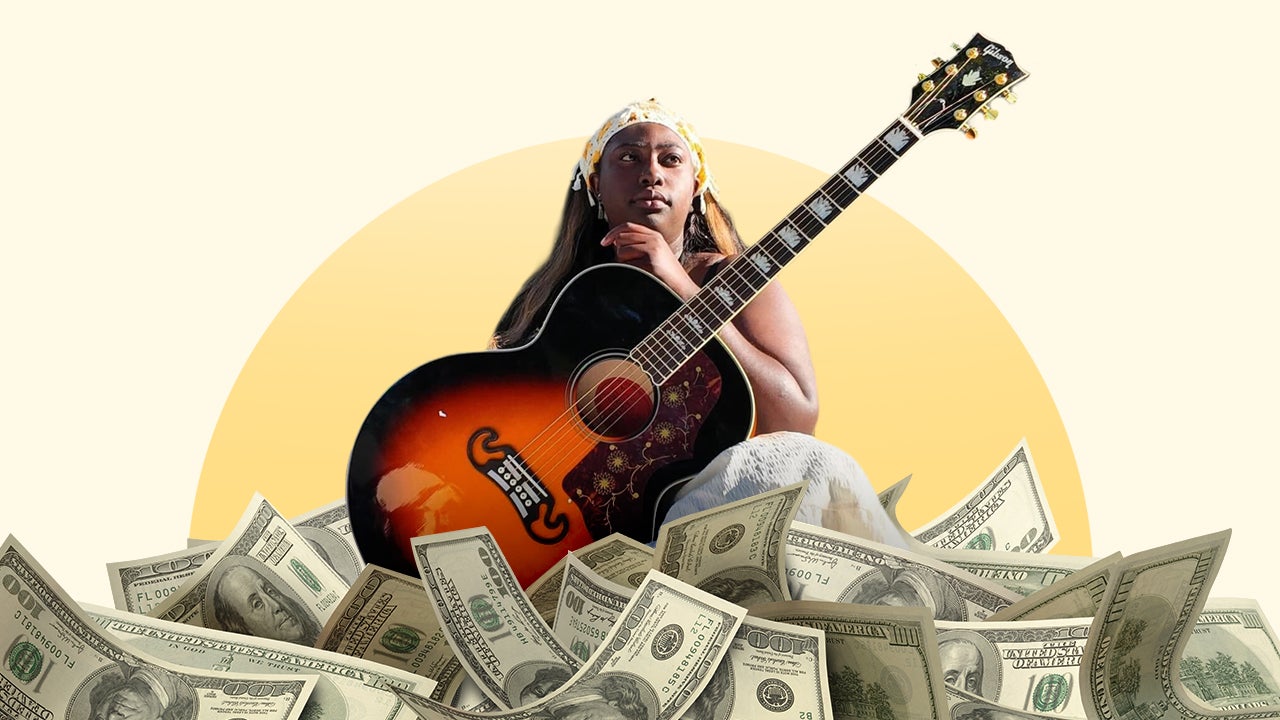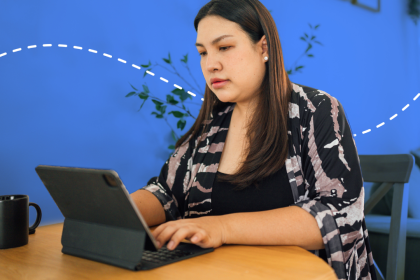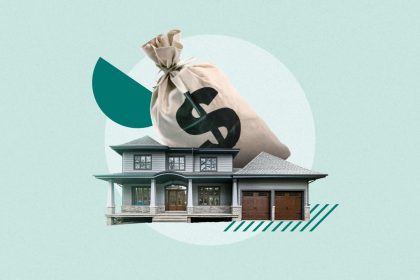Selena Cooper, 25, is a federal worker in South Carolina. After the government shut down on Oct. 1, the office where she works was closed, and her paychecks stopped coming through. It didn’t take long before she found herself with an overdraft balance on her checking account and $4,000 in credit card debt. To add insult to injury, that’s after having paid off three credit cards just three months prior.
“And I need to pay my bill, pay my bill! But I can’t. The government is closed!” she sang, sharing her experience in a TikTok to the tune of the popular 4 Non Blondes song, “What’s Up.”
The video went viral — hitting home for many others in a similar spot.
There are about 2.9 million federal government workers in the U.S., according to the most recent data from the Bureau of Labor Statistics, many of whom face a loss of income when the government shuts down. And they’re not the only ones feeling the pain of the labor market right now.
Close to 72,000 government employees have been laid off by the Department of Government Efficiency this year, according to Layoffs.fyi, a website tracking government and tech job cuts. Overall, through October, employers have announced close to 1.1 million job cuts — up 44% from the more than 761,000 cuts announced in all of 2024, Challenger, Gray & Christmas reports.
“It’s really nothing you can do, because it’s not your fault,” Cooper says. “It’s not something that we were prepared for.”
While finding yourself in debt due to loss of income might feel disorienting, it’s not uncommon. Here’s how it can impact you — and how you can dig yourself out.
When loss of income throws you into debt
Debt payoff is a huge undertaking, and Cooper has been successful in it. After graduating from college, she got a business credit card to start her photography business, using it to pay for equipment, space rentals and other expenses. The balance bled from her business card to her personal credit card accounts, reaching a total balance of around $9,000.
It took Cooper two years to pay down the debt, with her TikTok turning into a side hustle that helped with this endeavor. Sadly, when she only had about a $200 balance left, the government shut down. Cooper could see her paychecks pending in her checking account, but they never came through. Trying to keep up with the bills, including her car insurance, vision and dental insurance, housing and business insurance, she turned to her cards again.
“The debt isn’t as bad as it used to be, but paying off a credit card and being back at $4,000 within a month — that’s kind of insane,” Cooper says.
Her father and partner are facing a similar situation. Both are in the military, she says, and both aren’t getting paid.
“They’re just living,” she says. “There’s nothing they can really do about it… Everybody’s trying to get a loan or everybody’s trying to get some kind of money.”
Cooper’s story is just one example of the way events beyond your control can have a major impact on your financial situation. Whether it’s a temporary interruption in income or a longer-term job loss, debt might be the only solution when you’re out of better options.
The general advice is to have savings to serve as a safety net in such cases. But many people don’t have enough cash saved to rely on — in fact, more than half of U.S. adults (54%) said they don’t have enough savings to cover three months of expenses, according to Bankrate’s 2025 Annual Emergency Savings Report. And almost 1 in 4 (24%) said they have no emergency savings at all.
When you’re forced to fall back on your credit cards or take out a loan due to unforeseen circumstances, it might feel like a defeat. But there are ways to regain control over the situation — if you know the right steps to take.
How to navigate unplanned debt
The shutdown might be nearing its end with a deal reached in the Senate on Nov. 9. Cooper hasn’t heard anything about receiving back pay yet, but she sounds determined when she says she is going to get out of debt again. The holidays are a busy time for a photographer, and she’s preparing promotions and cutting down prices to attract clients.
It’s crucial to stay proactive when you’re facing an increasing debt burden. Here’s what you can do:
Review your expenses
The first thing to do is to take a look at your living expenses, says Lisa Robertson, a certified credit counselor and manager of counseling services at Parachute Credit Counseling.
“Prioritize the essential expenses: housing, food, utilities and essential transportation,” she recommends. “Second, temporarily pause non-essential spending. This may include dining out, entertainment, streaming subscriptions or even extra payments toward debt or savings contributions.”
That way, you’ll reduce your expenses as much as possible, which means you’ll also need to borrow less.
Stay in touch with your lenders
Contacting your lenders before you’re past due on any payment is key, Robertson says. Your credit card issuer, for example, might offer a range of solutions, from moving your due date to enrolling you into a hardship program. The same goes for your mortgage lender.
If you’ve been impacted by the government shutdown, you might have additional options.
“Financial institutions and service providers are aware of the shutdown and may have established assistance programs for affected federal workers,” Robertson says.
For instance, some federal credit unions offer zero-interest relief loans to help federal workers until they start to receive paychecks again. Some institutions also waive monthly fees on savings accounts or penalties for early withdrawal from a certificate of deposit (CD). Borrowers might also have the option to skip payments on loans or credit cards.
Note that during events such as the shutdown, the customer service lines might get extremely busy. Cooper shares that she experiences hold times of over an hour when calling her credit card issuer.
Get assistance for federal employees
If you’re a federal government employee, you may have access to additional assistance:
Local community support is available by dialing 211 or visiting 211.org.
Consider a side job
Cooper’s TikTok account has been a source of additional income, albeit inconsistent, and she continues her photography business.
You may not be interested in becoming a social media influencer, but finding quick new ways to earn cash isn’t a bad idea if you’ve lost your main source of income. Consider short-term, flexible side jobs to tide you over, Robertson recommends.
Continue making minimum payments
If you can, make at least minimum payments on your debts to avoid late fees, increased interest charges and damage to your credit.
“While we typically recommend always paying more than your minimum payments on debt, if it means that you won’t have enough cash for essentials and will have to charge those items, it is counterproductive,” Robertson says.
Plan for debt repayment
It’s healthy to take it one step at a time, but picking your debt repayment strategy might also feel empowering. This allows you to develop a game plan for the time you receive a steady income again.
Remember that you don’t have to go it alone. If you’re overwhelmed, you can reach out to a nonprofit credit counseling agency through the National Foundation for Credit Counseling. A counselor can help with budgeting and might offer a Debt Management Plan (DMP) could be a helpful tool. A DMP is a debt repayment program designed to help you pay your debts by reducing interest rates, payments and fees.
“You are not alone,” Robertson says. “Never be afraid to reach out for assistance and talk about your situation and how you’re feeling.”
Bottom line
Losing income can be devastating, especially when the circumstances are out of your control — and you end up in debt just to pay your bills.
Stay proactive in the areas of your financial life that are still under your control, both to minimize the growing debt and prepare to pay it off. Remember: this is a temporary setback. You can navigate it successfully.
“Take it day by day,” Cooper says when asked what she wants people in her situation to know. “Because one thing I’m not going to do is get stressed out over a credit card [debt] that could be fixed.”
Why we ask for feedback
Your feedback helps us improve our content and services. It takes less than a minute to
complete.
Your responses are anonymous and will only be used for improving our website.
Help us improve our content
Read the full article here
















